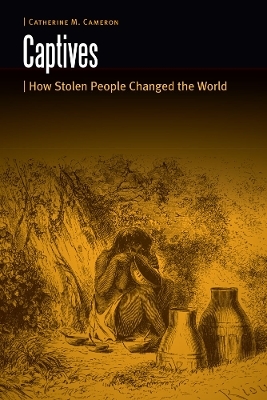
Captives
How Stolen People Changed the World
Seiten
2016
University of Nebraska Press (Verlag)
978-0-8032-9399-1 (ISBN)
University of Nebraska Press (Verlag)
978-0-8032-9399-1 (ISBN)
Catherine M. Cameron provides a detailed comparative study of captive-taking in small-scale societies and explores the profound impacts captives had on the societies they joined. Cameron’s book opens new avenues of research about captives as significant sources of culture change.
In Captives: How Stolen People Changed the World archaeologist Catherine M. Cameron provides an eye-opening comparative study of the profound impact captives of warfare and raiding have had on small-scale societies through time. Cameron provides a new point of orientation for archaeologists, anthropologists, historians, and other scholars by illuminating the impact that captive-taking and enslavement have had on cultural change, with important implications for understanding the past.
Focusing primarily on indigenous societies in the Americas while extending the comparative reach to include Europe, Africa, and Island Southeast Asia, Cameron draws on ethnographic, ethnohistoric, historic, and archaeological data to examine the roles that captives played in small-scale societies. In such societies, captives represented an almost universal social category consisting predominantly of women and children and constituting 10 to 50 percent of the population in a given society. Cameron demonstrates how captives brought with them new technologies, design styles, foodways, religious practices, and more, all of which changed the captor culture.
This book provides a framework that will enable archaeologists to understand the scale and nature of cultural transmission by captives, and it will also interest anthropologists, historians, and other scholars who study captive-taking and slavery. Cameron’s exploration of the peculiar amnesia that surrounds memories of captive-taking and enslavement around the world also establishes a connection with unmistakable contemporary relevance.
In Captives: How Stolen People Changed the World archaeologist Catherine M. Cameron provides an eye-opening comparative study of the profound impact captives of warfare and raiding have had on small-scale societies through time. Cameron provides a new point of orientation for archaeologists, anthropologists, historians, and other scholars by illuminating the impact that captive-taking and enslavement have had on cultural change, with important implications for understanding the past.
Focusing primarily on indigenous societies in the Americas while extending the comparative reach to include Europe, Africa, and Island Southeast Asia, Cameron draws on ethnographic, ethnohistoric, historic, and archaeological data to examine the roles that captives played in small-scale societies. In such societies, captives represented an almost universal social category consisting predominantly of women and children and constituting 10 to 50 percent of the population in a given society. Cameron demonstrates how captives brought with them new technologies, design styles, foodways, religious practices, and more, all of which changed the captor culture.
This book provides a framework that will enable archaeologists to understand the scale and nature of cultural transmission by captives, and it will also interest anthropologists, historians, and other scholars who study captive-taking and slavery. Cameron’s exploration of the peculiar amnesia that surrounds memories of captive-taking and enslavement around the world also establishes a connection with unmistakable contemporary relevance.
Catherine M. Cameron is a professor of anthropology at the University of Colorado, Boulder. She is the author of Chaco and After in the Northern San Juan: Excavations at the Bluff Great House and Invisible Citizens: Captives and Their Consequences.
List of Illustrations
Acknowledgments
1. The Captive in Space, Time, and Mind
2. Captive Taking in Global Perspective
3. The Captive as Social Person
4. Captives and the Creation of Power
5. Captives, Social Boundaries, and Ethnogenesis
6. Captives and Cultural Transmission
7. Captives in Prehistory
Notes
References
Index
| Erscheinungsdatum | 15.10.2016 |
|---|---|
| Reihe/Serie | Borderlands and Transcultural Studies |
| Zusatzinfo | 10 illustrations, index |
| Verlagsort | Lincoln |
| Sprache | englisch |
| Maße | 152 x 229 mm |
| Themenwelt | Geisteswissenschaften ► Archäologie |
| Geisteswissenschaften ► Geschichte | |
| Sozialwissenschaften ► Ethnologie ► Völkerkunde (Naturvölker) | |
| Sozialwissenschaften ► Soziologie | |
| ISBN-10 | 0-8032-9399-2 / 0803293992 |
| ISBN-13 | 978-0-8032-9399-1 / 9780803293991 |
| Zustand | Neuware |
| Informationen gemäß Produktsicherheitsverordnung (GPSR) | |
| Haben Sie eine Frage zum Produkt? |
Mehr entdecken
aus dem Bereich
aus dem Bereich
Schweden : Ambiguitäten verhandeln - Tolerieren als soziale und …
Buch | Softcover (2023)
Brill Schöningh (Verlag)
CHF 69,85
Buch | Softcover (2023)
transcript (Verlag)
CHF 75,60
eine postkoloniale Ethnografie journalistischer Praxis in Jordanien
Buch | Softcover (2023)
transcript (Verlag)
CHF 68,60


